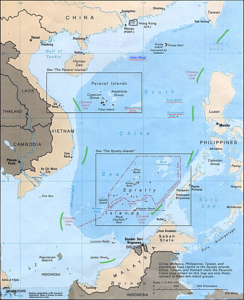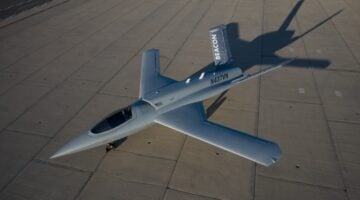
WASHINGTON: In 2016, the Defense Department flew aircraft or steamed ships through territories claimed by Albania, Brazil, Italy, Japan, Malta, and, well, China, according to the Pentagon’s annual report released today. So should Beijing be relieved it was not the sole focus of American Freedom of Navigation Operations (FONOPS) or should it feel slighted that it wasn’t our sole focus? Of course, China’s Pacific pushiness does get pride of place, with the most extensive single entry — but the 22-nation list also includes US allies and neutral powers like tiny Malta.
Indeed, to quote the accompanying press release, the Pentagon strives — sometimes to absurd extremes — to be “comprehensive (and) even-handed… challenging excessive maritime claims based on principle rather than identity of the coastal State asserting the claim.” (Ironically, the US has not ratified the UN Convention on the Law of the Sea, which codified in a treaty the longstanding principle of freedom of navigation. The right was first expounded in western law in 1609 by the estimable Hugo Grotius of Holland).

We have the challenge to Italy, which the US believes improperly “claimed historic bay status for the Gulf of Taranto.” Malta, for its part, improperly required “prior consent or prior notification” for foreign warships to enter its waters, which is one of the most common offenses in the report, committed in some form by 14 of the 22 countries. Japan is guilty of another common sin (committed by seven of 22), “extensive straight baselines” — that is, Tokyo claimed jurisdiction over large, squared-off areas of the ocean, rather than the irregularly curving boundaries that result from properly measuring distances off the nearest point of land.
All told, 13 of the 22 countries challenged were in East Asia or South Asia, a region of growing economies, rising nationalism, and complex island territories. Just four were in Europe, two in the Persian Gulf (Iran and Oman), two in the Americas (Brazil and Venezuela), and one in North Africa (Tunisia).
Twelve of the 22 countries’ claims were challenged multiple times, and it’s these that merit closer focus. Nine were in Asia. While that includes China, four countries with sprawling archipelagoes — Indonesia, Malaysia, the Maldives, and the Philippines, a currently problematic US ally — as well as quasi-ally India, frenemy Pakistan, unofficial US ally Taiwan, and would-be ally Vietnam. In the Mideast, both hostile Iran and neutral Oman received multiple challenges, both for claiming jurisdiction over the international Strait of Hormuz. The only other powers to get multiple challenges were tiny Albania and anti-American Venezuela.
We’ve reorganized the Pentagon’s apolitically alphabetical list by region and frequency of challenge below.

Multiple Challenges In 2016
(TTS = Territorial Sea, extending 12 nautical miles off a nation’s coast. EEZ = Exclusive Economic Zone, extending 200 nautical miles from shore.)
EAST & SOUTH ASIA (9)
- China: “Excessive straight baselines; jurisdiction over airspace above the EEZ; restriction on foreign aircraft flying through an Air Defense Identification Zone (ADIZ) without the intent to enter national airspace; domestic law criminalizing survey activity by foreign entities in the EEZ; prior permission required for innocent passage of foreign military ships through the TTS.”
- India: “Prior consent required for military exercises or maneuvers in the EEZ; security jurisdiction claimed in the contiguous zone.”
- Indonesia: “Limits on archipelagic sea lane passage through normal routes used for international navigation; prior notification required for foreign warships to enter the TTS and archipelagic waters; restriction on stopping, dropping anchor, or cruising without legitimate reason in seas adjoining TTS.”
- Malaysia: “Prior authorization required for nuclear–powered ships to enter the TTS; military exercises or maneuvers in the EEZ requires prior consent.”
- Maldives: “Prior authorization required for foreign ships to enter the EEZ.”
- Pakistan: “Prior consent required for foreign warships to conduct military exercises or maneuvers in the EEZ.”
- Philippines: “Claims archipelagic waters as internal waters.”
- Taiwan: “Prior notification required for foreign military or government vessels to enter the TTS.”
- Vietnam: “Prior notification required for foreign warships to enter the TTS.”
OTHER (4):
- Albania: “Prior authorization required for foreign warships to enter the territorial sea (TTS); excessive straight baselines.”
- Iran: “Restrictions on right of transit passage through Strait of Hormuz to Parties of the United Nations Convention on the Law of the Sea; prohibition on foreign military activities and practices in the EEZ.”
- Oman: “Prior permission required for innocent passage of foreign military ships through the TTS; requirement for innocent passage through the Strait of Hormuz (an international strait).”
- Venezuela: “Prior permission for overflight of the EEZ and Flight Identification Region (FIR).”

Challenged Once Only In 2016
(TTS = Territorial Sea, extending 12 nautical miles off a nation’s coast. EEZ = Exclusive Economic Zone, extending 200 nautical miles from shore.)
ASIA (4):
- Cambodia: “Excessive straight baselines.”
- Japan: “Excessive straight baselines.”
- South Korea: “Excessive straight baselines; prior notification required for foreign military or government vessels to enter the TTS.”
- Thailand: “Excessive straight baselines; consent required for military exercises in the EEZ.”
OTHER (5):
- Croatia: “Prior notification required for foreign warships to exercise innocent passage in the TTS.”
- Brazil: ‘Consent required for military exercises or maneuvers in the EEZ.”
- Italy: “Claimed historic bay status for the Gulf of Taranto.”
- Malta: “Passage by foreign warships through the TTS subject to prior consent or prior notification.”
- Tunisia: “Excessive straight baselines.”

